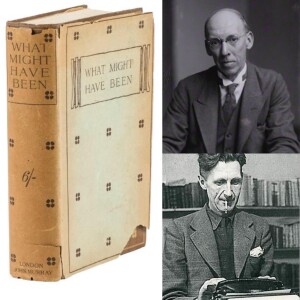This Jot deals with the final three writers that the bibliomaniac William White collected during his lifetime. Two of them– Emily Dickinson and Nathanael West –were American. Ernest Bramah was British.

Firstly, White admits that his own collection of Dickinson cannot compete with that housed in the Jones Library, Amherst, Massachusetts, her home town. For instance, he only managed to acquire second impressions of the poet’s Poems ( 1890), Poems: second series (1891) and Poems: third series (1896), all of which were brought out by Roberts Brothers of Boston. Today, Abebooks have all three of these first editions at an eye-watering £42,000 the lot. White also owned the first English edition of Poems (1890) which was printed from American sheets of the seventeenth edition with a cancel title page. Today, Abebooks has a copy priced at £2,100.
White declared that the rarest and most expensive of his Dickinson books was a second edition (1915) of The Single Hound: Poems of a Lifetime (1914), which was edited by Dickinson’s niece, Martha Dickinson Bianchi. Abebooks has this first at £1,700.
Ever the scholar, White also felt a need to collect the various biographies of Dickinson, the best of which was George Frisbie Whicher’s This was a Poet ( 1938). One of the principle experts on the poet seems to have been Thomas H. Johnson, whose Poems of Emily Dickinson (1955) and Letters of Emily Dickinson (1958) were praised by White as ‘scholarly productions in every sense of the word’. Mr Johnson also wrote an ‘ excellent ‘ biography.
For some reason White next chose to collect Nathanael West, the novelist who died at just 37 following a car smash and whose best book is possibly Miss Lonelyhearts. According to White, West’s other three novels, The Dream Life of Balso Snell, A Cool Million and The Day of the Locust, were in `1965, being reassessed and accordingly were becoming more sought after, but White managed to buy first editions of them for very reasonable prices. Characteristically, he also felt a need to buy all the reprints, all three of the lives of West and several translations. Today, we might agree with White that West’s appeal is likely to remain ‘limited ‘.
The happy accident that led to White’s decision to collect the works of Ernest Bramah, the English author of the Kai Lung series, was his wife’s discovery of him in anthologies published by Dorothy L, Sayers. Because few Americans knew anything about him, including the Librarian of Wayne State University, White was able to acquire sixteen of the first editions for little more than the $3 he had shelled out for Bramah’s first book—English Farming (1894), which the vendor had catalogued under ‘agriculture’.
In White’s view, Bramah’s Chinese stories were of a high literary order and unlike anything he knew in English fiction. The only Bramah book White did not possess, What Might have Been ( 1907), is today considered to be both a major exercise in science fiction, which predicted the fax, and a reflection of the fear felt by conservative elements in society at the burgeoning power and influence of the nascent Labour party. In it Bramah imagines a Britain in 1916 in which nationalisation and high taxes have alienated the middle classes from a Socialist government. A Unity League of anti-Socialists arises and takes over, imposing a paternalistic capitalism. George Orwell admired the book, but it has never been proved that he based Ninety Eighty- Four on it. Copies of What Might Have Been are very scarce and currently Abebooks, has no copy of any edition of this work. Strangely, Wikipedia lists Bramah as publishing A Guide to the Varieties of English Regal Copper Coins (1929) and A Handbook for Writers and Artists (1897), though there do not figure anywhere on Abebooks. Perhaps it’s worth looking out for them. [R M Healey]

English Farming and Why I Turned It Up was the full title of Bramah’s first book.
What Might Have Been was republished a couple of years ago by Handheld Press. A revised version, The Secret of the League, is – or was – easier to find.